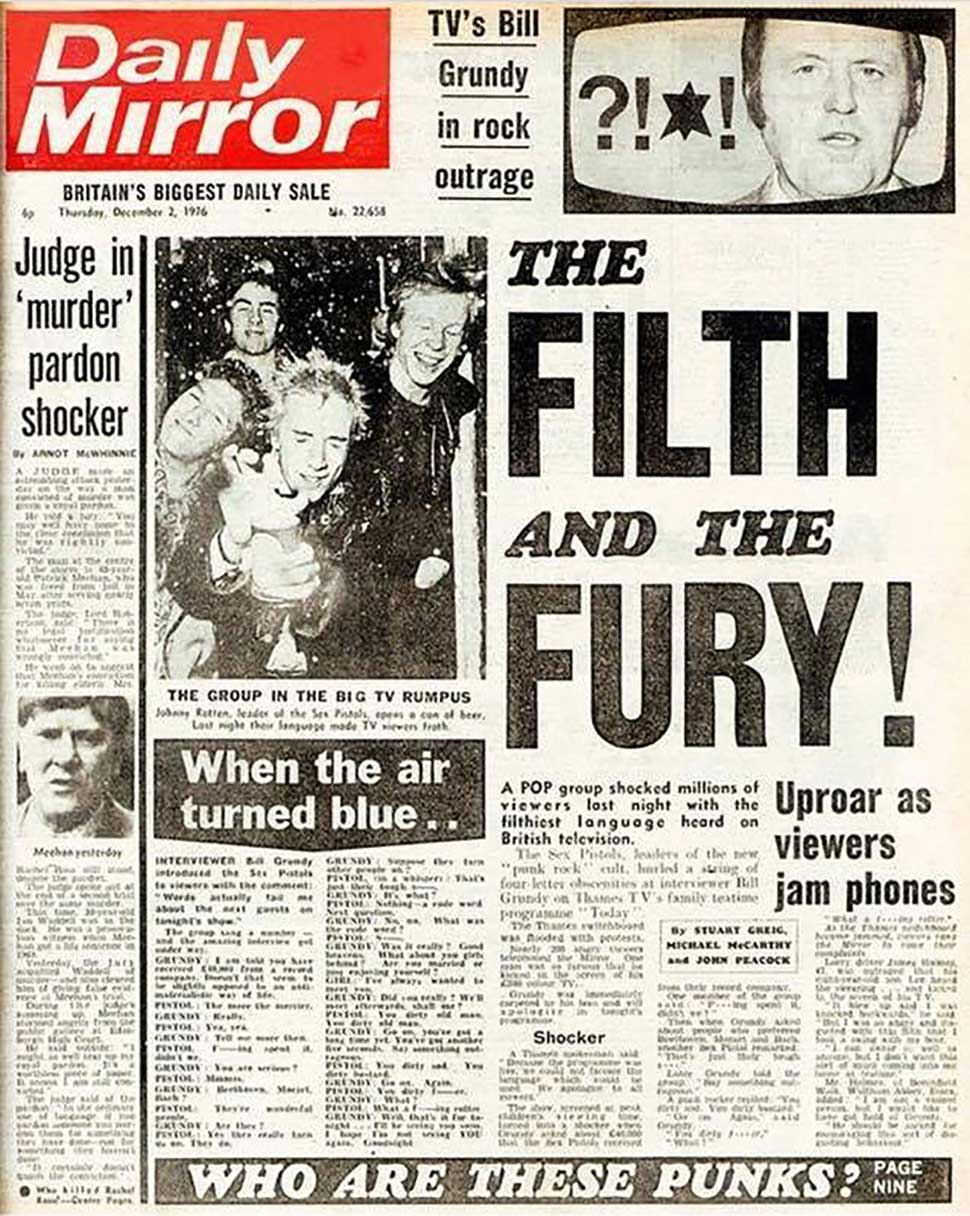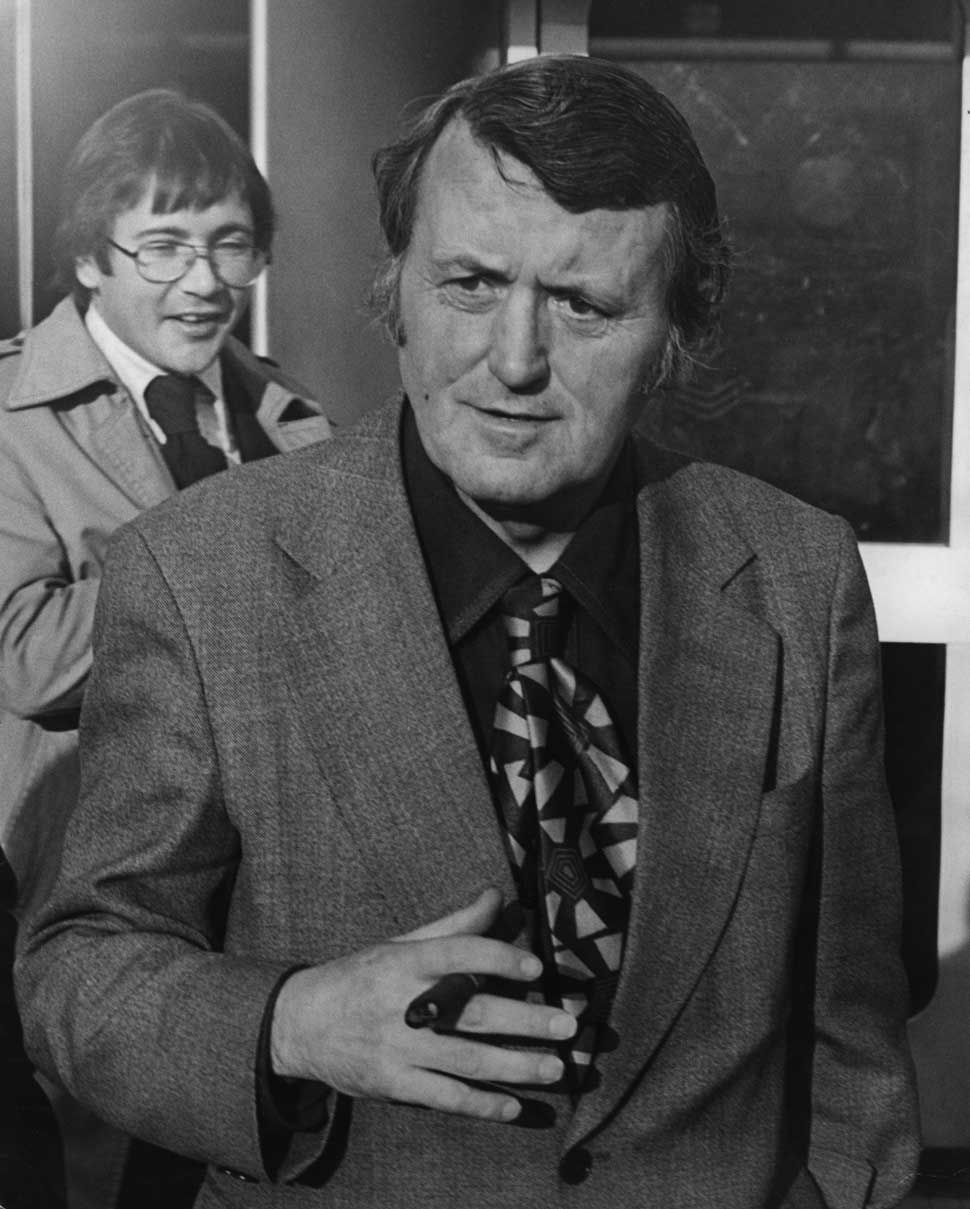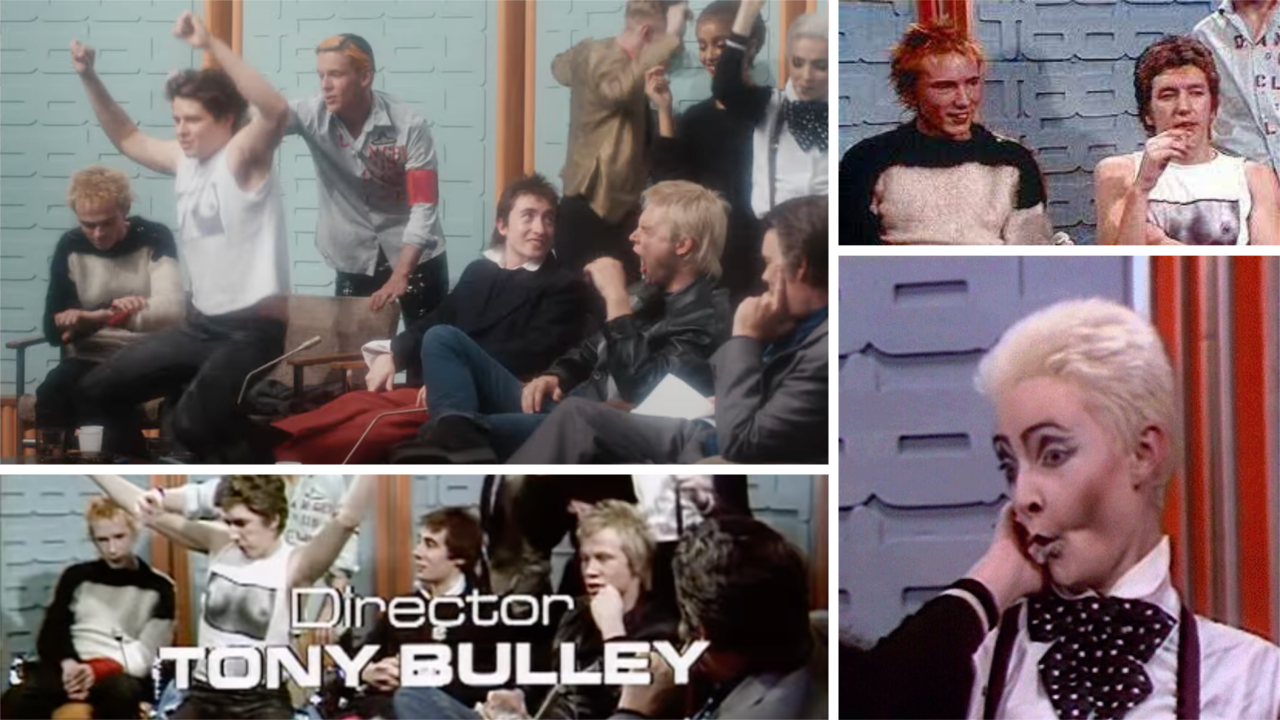It caused the biggest stink in British TV history. It brought punk to the masses and some say killed it stone dead. And, indirectly, it was because of Freddie Mercury’s teeth.
Queen had been booked to appear on Bill Grundy’s Today show, but then Freddie developed toothache. It was so bad that Freddie, who notoriously wasn’t keen on dentists, decided he had to make his first visit to one in 15 years, and Queen’s appearance was cancelled. A desperate EMI offered up new group the Sex Pistols as a last-minute replacement to Today’s producers. What happened next changed everything.
If you've been watching Pistol on Disney+, Danny Boyle's reimagining of the Sex Pistols' story via Steve Jones' book Lonely Boy, you might be wondering how much is real? Chrissie Hynde's relationship with Jones, for example, is fictionalised ("I didn't realise I was around this much," she said to Jones, who admitted it was "bollocks").
The Bill Grundy incident is pretty accurate visually but even tamer than the real life incident. When Steve Jones responded to Bill Grundy’s dare that he say “something outrageous” with the words “What a fucking rotter”, he fundamentally altered British broadcasting and took punk into the mainstream.
It would seem reasonable to assume that there is nothing new left to say about the incident. However, five years ago Classic Rock exclusively obtained internal files from Thames Television which give a unique insight into what happened on the day: memos criticising personnel, and hand-written notes by producers recording what happened in the aftermath were all inside the files.
Fascinatingly, they reveal that the controversy – which led to the Pistols being trailed by newspaper reporters for the rest of the band’s 18-month existence – could have been even worse. A memo from studio producer Mike Housego (who was in charge of the programme as it went out live) to Today’s overall boss Tom Steel reveals that after the show ended the group were led back down to the Green Room. While the Pistols were there, the memo reveals, harassed workers on the programme were receiving so many calls of complaint from viewers that they couldn’t answer them all.
Comically, the 12-line telephone system automatically diverted any unanswered calls to… the Green Room. The file indicates that a producer on the programme, named as Martin Lucas, ignored instructions to remain in the room with the Pistols, and left them and their posse – which included Sue Catwoman and some of the Bromley contingent, one of whom was Siouxsie Sioux – alone with the ringing phones. The result? The group started answering the phones and dishing out even more abuse.
How this evaded the press at the time – and how it evaded Pistol scriptwriter Craig Pearce – remains a mystery. It certainly would have added to the series and astonishing coverage at the time.
Lorry driver Jason Holmes, 47, told the papers he was so outraged that his eight-year-old son Lee had heard the swearing that he kicked in the screen of his brand new, £380 TV. He then rang Thames to complain about the damage to his telly (Rotten later remarked unsympathetically: “Haven’t they ever heard of the off button?”). Who knows what damage would have ensued if he had called while the Pistols were still in the Green Room.
In the years since, various conspiracy theories have attached themselves to the Pistols’ appearance on Today. One theory is that Grundy was drunk, with some allegations that he’d had the kind of ‘long lunch’ that was popular in the 70s. Grundy subsequently denied this, and there is no suggestion of him being under the influence in any of the internal documents.
The Thames TV papers also seem to put paid to the conspiracy theory that the group’s appearance was some kind of publicity scam concocted between Thames TV and their part-owners, EMI. From the panic and recriminations in the documents, it seems that the story of the day was simply one glorious British botch job. With unforeseeable dramatic consequences.
The Pistols were in rehearsals for the Anarchy tour when the call came in about the Today programme. They had signed to EMI two months previously. And while they had featured extensively in the music press, they had limited experience of TV interviews, having been featured only on BBC current affairs programme Nationwide, and interviewed by Janet Street Porter on The London Weekend Show.

Pistols bassist Glen Matlock says the band weren’t keen on being dragged out of rehearsals but had their arm twisted. “We very nearly didn’t do it,” he said. “This big limousine turned up outside this place. [Being] punk rockers we were like: ‘We’re not getting in that thing…’ Then this phone call came through from [band manager] Malcolm McLaren saying: ‘If you don’t do it your wages will be stopped this week.’ We were all in the car like a shot.”
In 1992, studio producer Mike Housego remembered: “They were only allotted 90 seconds, and I thought, ‘Well, not much can go wrong…‘” However, in one of the Thames documents outlining just what had gone wrong, an unnamed producer writes that the programme’s researcher, Christine Whitehead, had “warned Mike in advance that they might say ‘fuck’”.
It seems that the warning was not taken seriously – if it had been, it’s doubtful that the band would have been put into a Green Room (a TV term for a room in which guests are offered refreshments before going on air) with a fully stocked bar. Not that they were necessarily that drunk.
In Julien Temple’s The Filth & The Fury movie, Steve Jones says: “I remember downing about four bottles of Blue Nun and I was fucking just having a fucking good old time, pissed… by the time we went out there. And that’s all I remember.”
Matlock, however, maintains that the band had only had a couple of beers: “I had a beer or two, as we all did,” he told a TV interviewer in 2005. “Maybe Steve Jones found a bottle of wine or a bottle of whisky or something but he didn’t seem that kind of drunk to me.”
Bill Grundy’s late son, Tim, himself a broadcaster, later said with some bitterness that he felt the Pistols went on air with preconceived ideas of how they could set out to use the interview as a publicity stunt. “They were primed, I think, to shock,” he suggested. “To shock the nation then, an easy way to do it would be to pin down someone like my dad and get yourself on every single national newspaper in the country.”
However, watching the interview it seems pretty clear that the Pistols were just badly handled by Grundy. Although he refers in his introduction to the band being “more drunk than I am”, Grundy doesn’t seem under the influence either. In the aftermath of the programme, Grundy, who in articles for Punch had developed a self-styled image as a Dean Martin-style drunk, protested to The Guardian that he was “stone-cold sober. You cannot do a job like I do without being sober.”

A patronising introduction didn’t ingratiate him with the Pistols, and he then clearly got irritated by them as they started mimicking him reading the autocue. A former Thames executive, who asked not to be named, says the culture of TV in the 70s may have added to the clash: “I wasn’t there, but I worked at ITV in the 70s and people like Grundy were treated as Masters of the Universe.
"There was a lot of arrogance and mavericks working in telly then, and presenters did have a drink, and expect guests to just be thrilled to be on the telly. So when Grundy was faced with that situation and had what he probably viewed as snotty kids in front of him, it becomes understandable why he was dismissive.”
After his introduction and a short film on punk, the interview started badly, with Grundy challenging the group’s anti-materialistic credentials – they had, after all, just accepted a £40,000 advance from EMI. “We’ve fucking spent it, ain’t we?” says Steve Jones. Grundy appears not to hear the profanity, which wasn’t that easily audible as people were talking across each other, although in the hand-written notes on the Thames documents it says: “Bill told to ‘cool it’ on earpiece.”
Grundy took no notice. Later, the presenter claimed he’d been pursuing a deliberate strategy “to prove that these louts were a foul-mouthed set of yobs – and that is what I did prove.”
Mike Housego sensed danger but decided that letting the interview continue would be less problematic than trying to clear the Pistols from the studio. “I could talk to Bill through his ear-piece and tell him to cut the interview right there and then and we could actually get into a film very quickly. But it still takes 30 seconds to get a film rolling so you’ve still got 30 seconds of abuse to listen to. And then you’ve got to rely on the guys on the studio floor to get the person out of the studio, which could lead to even more trouble than the interview was to start with. So, as this was the last story on the programme, I let it go.”
Housego had no way of predicting the extent to which Grundy would lose it. The presenter’s flirting with Siouxsie Sioux, who was standing behind the band – and was aged 19 at the time; Grundy was 53 – provoked Jones’s comment: “You dirty sod. You dirty old man!” Grundy goads him (“Go on, you’ve another five seconds. Say something outrageous”). The guitarist responds with: “You dirty bastard… You dirty fucker,” adding the wonderful phrase: “What a fucking rotter!”
And with that Jones became the first working-class person to say ‘fuck’ on TV. Or so people thought. In Pistol, Lydon's character corrects that, saying: "It's a great matter of pride to the Irish people that the first person to say 'fuck' on TV was Brendon Behan'." He's right. It's a little known fact that the writer Behan was the first person to swear on British TV, in1956, in an interview with Panorama. According to the interviewer, Malcolm Muggeridge, Behan "was drunk and did not utter throughout it one single comprehensible word". As a result, the only complaints were about his drunkness. No-one really understood that he'd sworn.
In 1976, the tabloids, an apparently the nation, went berserk. Writing for The Guardian in 2007, Malcolm McLaren claimed that he was delighted by the incident. “I knew the moment the autocue lady threw up her hands and her bag, her make-up cascading through the air, that we had smashed the deception. It was live TV and the Sex Pistols were front-page.”
Steve Jones’ memory of McLaren’s reaction is markedly different: “He was terrified. He was shitting himself.”
In many ways the careers of Grundy and the Pistols never recovered from the confrontation. Grundy was disciplined by Thames head Jeremy Isaacs (who would later become the head of Channel 4). The beleaguered boss’s internal memo scolding staff said the conduct of the interview fell far below his usual standards’. Today was cancelled two months later, and Bill Grundy never worked in prime-time television again.
He died of a heart attack in 1993 at the age of 69. The Pistols later twisted the knife in the lyrics to the myth-making but embarrassing No One Is Innocent (The Biggest Blow): ‘God save television/ Keep the programmes pure/God save William Grundy/From falling in manure.’
The infamy that surrounded the Pistols as a result of the Today show turned the group into stars, but some say the chaos it brought ended up wrecking their career. In his acclaimed punk tome England’s Dreaming, Jon Savage says that the impact of the Today appearance had “a totally disastrous effect on the group: from then until their demise in January 1978, they added only four new songs to their repertoire and their approach to their audience and their music remained the same. They were flies in the amber of notoriety.” EMI dropped them, gigs were cancelled, Glen Matlock left and Sid Vicious joined.
Which was when Freddie Mercury had his final encounter with the band. Both groups were recording at Wessex studios in Highbury, north London in 1978, when a visibly refreshed Sid started haranguing Freddie: “Ah, Freddie Mercury, still bringing ballet to the massses are you?”
“Oh yes, Mr Ferocious, dear,” said Freddie, without missing a beat. “We’re doing our best.”
The Pistols’ best was already behind them.
